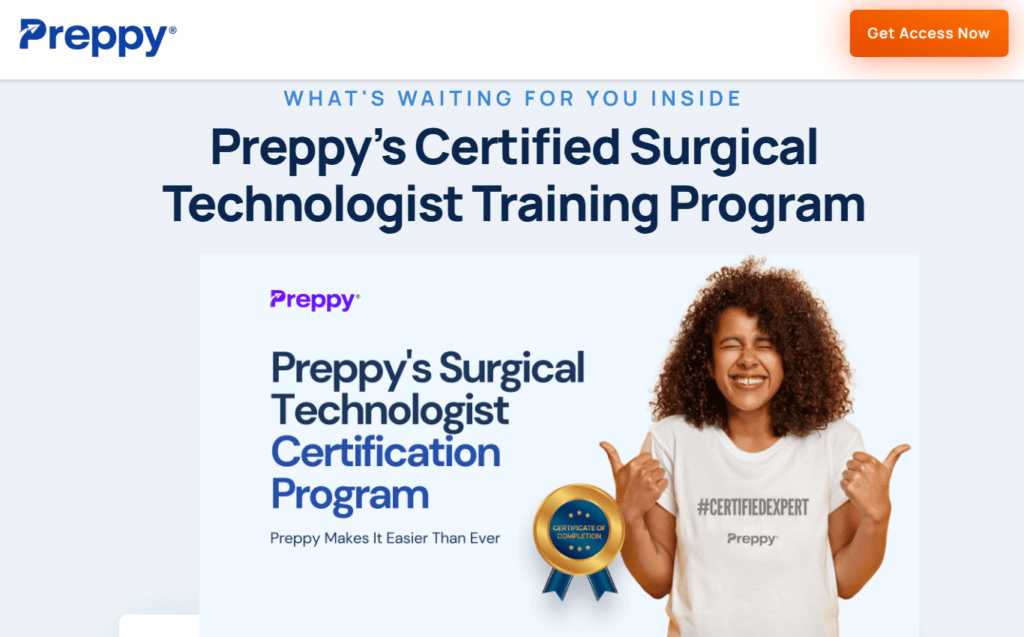If you aspire to become a Surgical Tech you must have also thought of enrolling in a surgical tech school.
While the prospect of working alongside surgeons in the operating room is exciting, the journey to becoming a Surgical Tech involves rigorous training and education.
Understanding the challenges you may face in surgical tech school can help you prepare and succeed in this demanding yet rewarding field.
So in this article, we’ll discuss about surgical tech schools, the challenges you face in a surgical tech school, the challenges you face till you become an established surgical tech, and how can you avoid these challenges.
Moreover, we’ll also discuss about a Surgical Tech Training Program that is recommended by Industry Veterans, that is affordable, gives an externship, and makes you ready for certification, faster in as little as 4 months.
So, let’s get started.

Surgical Tech Schools
From a young age, many of us are conditioned to see education as the pathway to success.
Whether it’s the structured environment of a classroom or the guidance of knowledgeable instructors, we are hardwired to value formal education.
This mindset extends into specialized fields like surgical technology, where the right educational background can pave the way for a successful career.
Attending a surgical tech school provides the structured education and practical experience needed to excel in this field.
Students gain the knowledge and skills necessary to support surgical teams and ensure patient safety.
Hands-on training and certification further enhance their qualifications, making them valuable assets in the operating room.
So, by choosing the right educational path, aspiring surgical technologists can build a solid foundation for a rewarding and impactful career in healthcare.
Read -> Surgical Tech Requirements
Here are the 2 main programs you get in surgical tech schools:
Associate Degree Program
An Associate Degree in Surgical Technology typically takes about two years to complete and is offered by community colleges and some universities.
This program provides a comprehensive education that includes both general education courses and specialized training in surgical technology.
Students learn about human anatomy, microbiology, and pharmacology, alongside surgical procedures, patient care, and medical ethics.
The associate degree program not only prepares students for certification exams but also provides a broader educational foundation, which can be beneficial for career advancement or further education.
Read:
-> What Does a Surgical Tech Do?
Certificate/Diploma Program
Certificate or diploma programs in surgical technology are generally shorter than associate degree programs, often taking about a year to complete.
These programs focus more directly on the skills and knowledge required for surgical technologists, with less emphasis on general education.
Students in certificate programs will learn about sterile techniques, surgical instruments, patient care, and operating room procedures.
These programs are ideal for individuals looking to quickly enter the workforce and start their careers in surgical technology.
You May Also Like:
-> Surgical Tech Course Online
-> Surgical Tech Online Programs
-> Surgical Tech Certificate Program
-> Accredited Surgical Tech Programs
-> Schools With Surgical Tech Programs
Coursework in Surgical Tech Schools
The coursework for surgical tech programs typically includes a mix of theoretical and practical subjects.
In an associate degree program, students can expect to take general education courses such as English, math, and social sciences.
But the specialized courses are the same for both programs. Here are the specialized curricula:
Anatomy and Physiology: Understanding the structure and function of the human body.
Microbiology: Studying microorganisms and their effects on humans.
Surgical Procedures: Learning about different types of surgeries and the role of the surgical technologist.
Sterilization Techniques: Methods to ensure a sterile environment in the operating room.
Medical Ethics: Understanding the ethical considerations in patient care.
Hands-On Training
A critical component of surgical tech education is hands-on training. Most programs include lab work, where students practice surgical techniques and procedures in a controlled environment.
Additionally, externships are a vital part of the curriculum, providing real-world experience in healthcare settings.
During an externship, students work under the supervision of experienced surgical technologists and medical professionals, gaining practical skills and confidence needed for their future careers.
Certification
Certification is an important step for surgical technologists, as it demonstrates a standardized level of knowledge and competence.
There are 3 main certifications available, including:
Tech in Surgery – Certified (TS-C) by NCCT
This certification is awarded by the National Center for Competency Testing and is designed for those who have completed an accredited surgical technology program or have equivalent work experience.
This is the most popular option among surgical techs and employers.
Nationally Certified Surgical Technologist (NCST) by AAH
Offered by the American Allied Health, this certification is for individuals who have graduated from an accredited program or have relevant work experience.
Certified Surgical Technologist (CST) by NBSTSA
This certification, provided by the National Board of Surgical Technology and Surgical Assisting, is widely recognized and mandatorily requires graduation from a 2 year CAAHEP or ABHES accredited program.
Also Read:
-> Surgical Tech Certification Online
-> Can You Be A Surgical Tech Without Certification?
Challenges You Face in The Surgical Tech School
Embarking on a journey to become a Surgical Technologist is a commendable endeavor, filled with the promise of making a significant impact on patients’ lives.
However, it’s essential to recognize the substantial challenges that accompany this path. These obstacles are not just minor inconveniences; they can be deeply stressful and emotionally draining.
From the high costs of education to the inflexibility of traditional programs, these challenges can profoundly affect your journey.
Here are the challenges:
High Tuition Costs
One of the most daunting challenges is the high cost of tuition. Surgical tech programs can range from $10,000 to $40,000, depending on the institution and the program length.
This financial burden is substantial and can be overwhelming for many aspiring students. The weight of these costs can lead to anxiety and uncertainty about the future.
The dream of becoming a Surgical Technologist often comes with the heavy price of financial strain.
Added Expenses
Beyond tuition, there are numerous additional expenses that can quickly accumulate. These include accommodation costs, especially if relocation is necessary, as well as expenses for books, supplies, lab fees, and other miscellaneous items.
These added financial burdens can exacerbate the stress, making it challenging to focus on studies. The constant worry about making ends meet can overshadow the educational experience.
Student Loan Debt
To manage the high tuition and added expenses, many students resort to taking out loans, which leads to significant student loan debt.
This debt can be a source of constant stress and worry. Graduates often face the daunting task of repaying these loans soon after securing a job, and watching a large portion of their paycheck go towards loan repayment can be disheartening.
The financial pressure can feel relentless, making it difficult to enjoy the fruits of their hard-earned career.
Traveling to Surgical Tech School
For those attending traditional on-campus programs, daily travel adds another layer of complexity. The need to drive to college every day and adhere to a fixed schedule can be exhausting.
For students juggling other responsibilities, such as work or family, the daily commute can become a significant burden. The constant rush to be on time can lead to burnout and frustration.
Lack of Flexibility
Traditional surgical tech programs often lack the flexibility needed by many students. Missing a class can set you back significantly, and in some cases, you might have to wait months to retake it.
This lack of flexibility can hinder your progress and extend the time it takes to complete the program. The rigid structure can feel suffocating, leaving little room for life’s unexpected events and responsibilities.
Not Adult-Friendly
When combined—high costs, additional expenses, student loan debt, daily travel, and lack of flexibility—these challenges make traditional surgical tech schools less adult-friendly.
Adult learners, who often have jobs, families, and other commitments, find it particularly difficult to balance their studies with other responsibilities.
The overwhelming stress and strain can lead to higher dropout rates, making it hard for even the most determined students to see their journey through to the end.
The realization that the traditional path may not be the best option can be disheartening and lead to feelings of defeat.
To sum up:
Pursuing a career as a Surgical Technologist is a noble and rewarding goal, but it is fraught with significant challenges. These obstacles can take an emotional toll, causing stress, anxiety, and uncertainty about the future.
Understanding and acknowledging these challenges is crucial. By exploring alternative educational paths, such as online programs, you can find ways to overcome these hurdles and achieve your career aspirations.
More on that later…
Challenges You Face Till You Become An Established Surgical Tech

The journey to become an established Surgical Tech is rewarding but challenging as well.
While the role promises a fulfilling career in the healthcare industry, it also demands significant effort, perseverance, and resilience.
From navigating educational hurdles to dealing with workplace pressures, aspiring surgical techs face a variety of challenges that test their commitment and dedication.
Here are the challenges:
Educational Hurdles
The first significant challenge is the educational requirement. To become a Surgical Technologist, you typically need to complete an accredited surgical technology program, which can range from a certificate program to an associate degree.
These programs cover extensive coursework, including anatomy, microbiology, and surgical procedures. The rigorous academic load can be overwhelming, especially for students juggling other responsibilities like work or family.
Moreover, the high tuition costs, which can range from $10,000 to $40,000, add a financial strain, often necessitating student loans and resulting in debt.
Clinical And Practical Experience
Gaining practical experience through clinical rotations or externships is crucial for aspiring surgical techs. This allows students to apply theoretical knowledge in real-world settings.
However, securing externship placements can be competitive and challenging. Students must demonstrate competence and professionalism, often in high-pressure environments.
Additionally, these clinical hours can be physically demanding and emotionally draining, as students are exposed to the realities of surgical procedures and patient care.
Certification Exam
After completing their education, aspiring surgical technologists must pass a certification exam to become officially recognized in the field.
The most common certifications are the Tech in Surgery – Certified (TS-C) offered by the NCCT and the Nationally Certified Surgical Technologist (NCST) by the AAH.
Preparing for these exams requires rigorous study and a deep understanding of surgical principles and practices.
The pressure to pass these exams on the first attempt can be immense, adding to the stress experienced by candidates.
Maintaining Certification
Once certified, surgical technologists must maintain their certification through continuing education and periodic recertification.
For both the TS-C and NCST certifications, this involves completing a certain number of continuing education units (CEUs) and staying updated with the latest advancements in surgical technology.
The ongoing requirement for professional development ensures that surgical technologists remain competent and knowledgeable, but it also demands time, effort, and sometimes additional costs.
Continuing Education
Continuing education is vital for surgical techs to stay current with evolving medical technologies and procedures. Students can do that by attending workshops, seminars, and additional training courses.
Balancing continuing education with work responsibilities can be challenging, particularly for those working full-time.
The commitment to lifelong learning is essential for career advancement but can also be a source of ongoing stress and time management challenges.
Workplace Pressures
The surgical environment is inherently high-stress and fast-paced. Surgical technologists must be prepared to work long hours, often standing for extended periods.
The need for precision and efficiency during surgeries is critical, as any error can have serious consequences. The pressure to perform flawlessly can be intense, contributing to job-related stress and anxiety.
Additionally, surgical technologists often work in shifts, including nights, weekends, and holidays, which can disrupt personal life and lead to burnout.
High Stress
The combination of educational demands, certification pressures, and workplace challenges can lead to significant stress for surgical technologists.
Managing this stress is crucial for maintaining mental and emotional well-being. Practice mindfulness, exercise, and seek support from colleagues and mentors to destress.
However, the high-stress nature of the job remains a persistent challenge that requires continuous coping strategies.
Physical Demands
The role of a surgical technologist is physically demanding. It requires long hours of standing, handling heavy surgical instruments, and assisting in surgeries that can last several hours.
The physical toll of the job can lead to fatigue and musculoskeletal issues. Proper ergonomics, regular breaks, and maintaining physical fitness are essential to manage the physical demands of the job.
How Can You Avoid The Challenges?
Embarking on a career as a Surgical Technologist comes with its fair share of challenges, from high tuition costs to maintaining certification.
However, with careful planning and the right resources, you can navigate these obstacles effectively.
Here’s how you can avoid the common challenges faced by aspiring surgical techs and set yourself on a successful career path.
Choose The Right Training
One of the first steps to avoid challenges is choosing the right training program. They are the Online surgical tech programs. It offers flexibility and affordability, making them a great option for many students.
Unlike traditional programs that require you to attend classes on campus, online programs allow you to study at your own pace and from any location.
This flexibility is particularly beneficial for those who have other commitments, such as work or family.
When selecting an online program, you need to ensure a few things. Here’s what you should look for in the Right Surgical Tech Training:
- It should be Accredited.
- It should be 100% online, and Self-Paced.
- You should get a University Certificate, post-completion of your training program.
- It should be Affordable, ideally under $3000.
- The course should be completed Faster within 4 months.
- It should be TS-C Certification Ready.
- You should get an Externship Opportunity.
Acquire Clinical Experience
Gaining hands-on clinical experience is crucial for becoming a competent surgical technologist. Look for programs that include externship opportunities, allowing you to work in real healthcare settings.
Externships provide invaluable experience, enabling you to apply your theoretical knowledge and develop practical skills. Additionally, they often lead to job offers post-graduation.
Choosing a program that facilitates local externships can minimize travel and relocation expenses, making the process more manageable.
Choose The Right Certification
Selecting the right certification is essential for your career. The Tech in Surgery – Certified (TS-C) certification offered by the National Center for Competency Testing (NCCT) is a respected credential in the field.
To avoid challenges associated with certification, choose a program that prepares you thoroughly for the TS-C exam.
Preparing well for the certification involves rigorous study, using study guides, and taking advantage of online resources.
Retake important lessons and focus on areas where you need improvement to ensure you pass the exam on your first attempt.
Join AST Membership
Joining the Association of Surgical Technologists (AST) can provide numerous benefits that help you avoid challenges in your career.
AST membership offers access to continuing education resources, networking opportunities, and the latest industry updates.
Staying connected with a professional organization keeps you informed about new developments in surgical technology and helps you maintain your certification through continuing education units (CEUs).
Additionally, being part of a professional community provides support and guidance from experienced colleagues.
Also Read:
-> How To Become A Surgical Tech?
-> Pros And Cons Of Being A Surgical Tech
-> How To Become A Certified Surgical Tech?
-> How Long Does It Take To Become A Surgical Tech?
#1 Surgical Tech Training Program Recommended by Industry Veterans
Choosing the right training program is crucial for aspiring Surgical Technologists. Among the many options available, Preppy’s Surgical Tech Training Program stands out as the top choice recommended by industry veterans.
This program is known for its comprehensive curriculum, flexible learning options, and strong preparation for certification exams.
Preppy’s Surgical Tech Training Program

Preppy’s Surgical Tech Training Program is designed to provide students with the knowledge, skills, and practical experience needed to excel in the surgical technology field. It combines online learning with hands-on externships to ensure a well-rounded education.
Key Features:
- The program is entirely online and self-paced, allowing students to study at their convenience. This flexibility is ideal for those who need to balance their studies with work or family commitments.
- Upon completing the program, students receive a certificate from an accredited University, a reputable 150-year-old non-profit institution.
- Preppy’s program offers an externship opportunity providing real-world experience in healthcare settings, located close to where you live.
- The curriculum of this program aligns with the certification requirements and makes you ready for the TS-C certification exam administered by the NCCT.
- The program is designed to be completed in as little as four months, allowing students to enter the workforce quickly.
- Lastly, at a cost of just $1,599, Preppy’s program is significantly more affordable than many traditional on-campus programs.
So, if you want to become a surgical tech, consider enrolling in Preppy’s Surgical Tech Program and start your career faster at an affordable price, by getting ready to get certified.
Read More:
-> Surgical Tech Job Description
Conclusion
We hope this article enlightens you about the Surgical Tech schools, the challenges of a Surgical Tech school, and how you can avoid these challenges.
While pursuing a career as a Surgical Tech is a commendable goal, it’s important to be aware of the challenges that come with traditional surgical tech programs.
These significant obstacles can impact your educational journey. Being prepared and exploring alternative educational paths, such as online programs, can help you overcome these challenges and achieve your career goals.
Ultimately, if you’re just starting out or looking to advance your career, Preppy’s Surgical Tech training program offers the perfect blend of features to help you achieve your goals.
Related:
-> CVOR Tech
-> Scrub Nurse Vs Surgical Tech
-> 6-Week Surgical Tech Program
-> Surgical Tech Vs Surgical Assistant





